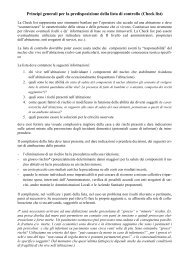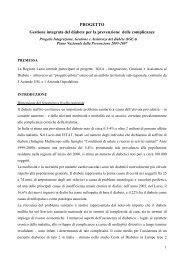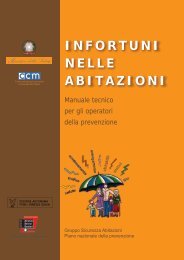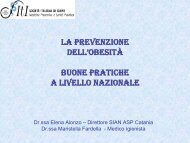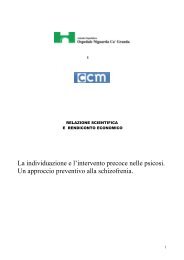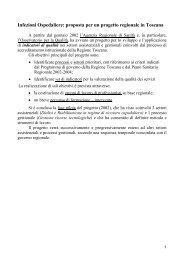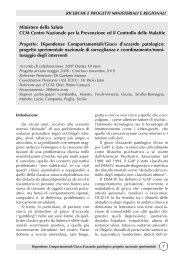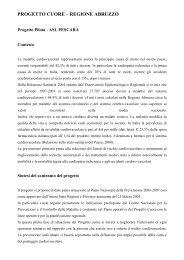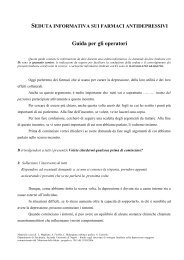Gaining health : analysis of policy development in European ...
Gaining health : analysis of policy development in European ...
Gaining health : analysis of policy development in European ...
Create successful ePaper yourself
Turn your PDF publications into a flip-book with our unique Google optimized e-Paper software.
tion from sister medical specialities. There are no other<br />
career pathways or tra<strong>in</strong><strong>in</strong>g opportunities, and one Masters<br />
Degree <strong>in</strong> Public Health is available at this medical faculty”<br />
(40). The <strong>health</strong> system <strong>in</strong> Greece is extremely medicalized,<br />
with physicians dom<strong>in</strong>at<strong>in</strong>g decision-mak<strong>in</strong>g bodies related<br />
to public <strong>health</strong>. As one respondent for this case study put<br />
it, “the Greek population still see physicians as gods”.<br />
In accordance with the 2005 Law on Public Health, a General<br />
Secretariat and General Directorate for Public Health<br />
was established <strong>in</strong> the MHSS. One <strong>of</strong> the ma<strong>in</strong> responsibilities<br />
<strong>of</strong> the new Directorate is to propose policies and<br />
strategies for public <strong>health</strong> <strong>in</strong> close collaboration with the<br />
National Council for Public Health. The National Council<br />
has been reorganized over the years with chang<strong>in</strong>g governments,<br />
seem<strong>in</strong>gly suffer<strong>in</strong>g from the general party politicization<br />
that dom<strong>in</strong>ates the public sector <strong>in</strong> Greece. Intended as<br />
an <strong>in</strong>dependent organization, when fully operational it is to<br />
be guided by a 15-member scientific committee, appo<strong>in</strong>ted<br />
by the M<strong>in</strong>ister and <strong>in</strong>clud<strong>in</strong>g staff <strong>of</strong> the MHSS.<br />
One <strong>of</strong> the problems faced for many years by the National<br />
School <strong>of</strong> Public Health, which provides postgraduate<br />
tra<strong>in</strong><strong>in</strong>g <strong>in</strong> public <strong>health</strong>, is that its graduates have not found<br />
positions <strong>in</strong> the public sector demand<strong>in</strong>g their level <strong>of</strong> tra<strong>in</strong><strong>in</strong>g.<br />
There is a small f<strong>in</strong>ancial <strong>in</strong>centive for those who undergo<br />
this postgraduate tra<strong>in</strong><strong>in</strong>g, <strong>in</strong> the form <strong>of</strong> a scientific<br />
supplement to their salary <strong>in</strong> the public sector. Public <strong>health</strong><br />
does not have a high status, and as yet a critical core <strong>of</strong><br />
public <strong>health</strong> experts has not been created <strong>in</strong> the country.<br />
Accord<strong>in</strong>g to Article 5 <strong>of</strong> the 2005 Law on Public Health,<br />
“public <strong>health</strong> services are provided by specialized scientists<br />
who belong to the Body <strong>of</strong> Public Health Specialists and the<br />
necessary tra<strong>in</strong><strong>in</strong>g and experience”. This <strong>in</strong>cludes “scientists<br />
from the wider field <strong>of</strong> <strong>health</strong> sciences, the environment,<br />
communication, education, and social and economic sciences”.<br />
This body has not yet been established, so it is not<br />
possible to assess where they might be employed and what<br />
might be their impact.<br />
3.2. F<strong>in</strong>ancial resources<br />
Without clearly def<strong>in</strong>ed policies for tackl<strong>in</strong>g NCD, it is not<br />
possible to assess resources designated for that purpose.<br />
On the whole, fund<strong>in</strong>g for NCD prevention seems to be on<br />
a project basis.<br />
3.3. Research<br />
There is a great deal <strong>of</strong> scattered research related to NCD,<br />
but this is not collected to give a comprehensive picture.<br />
Regular surveys <strong>of</strong> lifestyles and behaviour have not yet<br />
been <strong>in</strong>stituted on a national basis <strong>in</strong> Greece. This appears<br />
to form part <strong>of</strong> a vicious circle, whereby the limited and<br />
discretionary Greek welfare state has not required extensive<br />
assessments <strong>of</strong> its citizens and the lack <strong>of</strong> such <strong>in</strong>formation<br />
keeps potential <strong>health</strong> challenges out <strong>of</strong> the public eye.<br />
Where limited surveys are carried out, they depend on<br />
the <strong>in</strong>terests <strong>of</strong> <strong>in</strong>dividual researchers and the <strong>in</strong>stitutions<br />
<strong>in</strong> which they work, as seen <strong>in</strong> relation to nutrition, or they<br />
are carried out <strong>in</strong> relation to EU-funded programmes.<br />
The need for such surveys to uncover the <strong>health</strong> challenges<br />
<strong>in</strong> Greece is evident. In 2006, under the leadership<br />
<strong>of</strong> Jiannis Tountas, Associate Pr<strong>of</strong>essor <strong>of</strong> Social Medic<strong>in</strong>e<br />
at Athens University, the first national survey <strong>of</strong> <strong>in</strong>equalities<br />
<strong>in</strong> <strong>health</strong> was carried out (41). The ESOMAR social grades<br />
were used, based on the age at which formal education<br />
term<strong>in</strong>ates and the occupation <strong>of</strong> the ma<strong>in</strong> <strong>in</strong>come earner.<br />
Initial results <strong>in</strong>dicate patterns similar to those found <strong>in</strong><br />
other <strong>European</strong> countries, with chronic diseases be<strong>in</strong>g<br />
more frequent among the lowest compared to the highest<br />
socioeconomic class. Use <strong>of</strong> <strong>health</strong> services, accord<strong>in</strong>g<br />
to the organization under which people are <strong>in</strong>sured, also<br />
<strong>in</strong>dicates the severe <strong>in</strong>equalities <strong>of</strong> access <strong>in</strong>herent <strong>in</strong> the<br />
Greek system.<br />
The reorganized National Council for Public Health is to be<br />
an <strong>in</strong>dependent organization with its own budget, under the<br />
aegis <strong>of</strong> the MHSS but without its adm<strong>in</strong>istrative control. It<br />
is to be responsible for oversee<strong>in</strong>g the scientific work <strong>of</strong> the<br />
Chapter 4<br />
119<br />
Case studies: <strong>policy</strong> <strong>development</strong> <strong>in</strong> countries for tackl<strong>in</strong>g noncommunicable diseases



